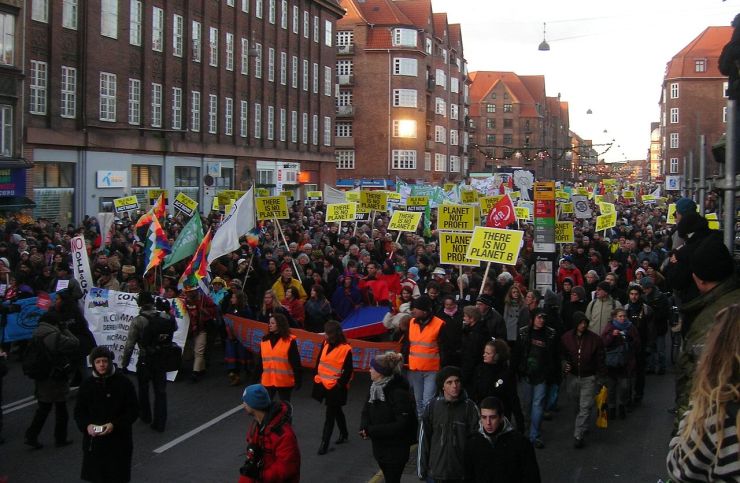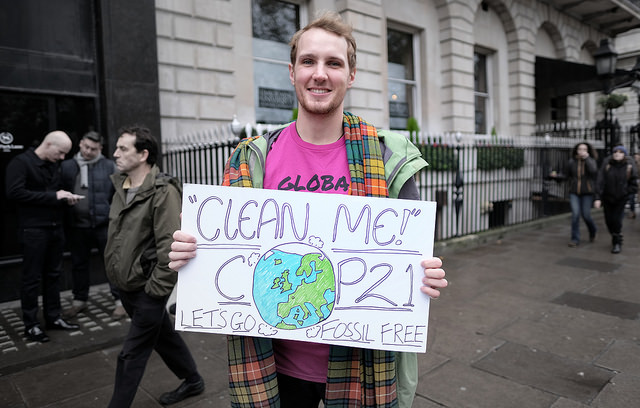By John Sayer.
The climate talks in Paris, known as COP21, quietened down on Sunday. For the most dedicated, issues related to the environment, development, business and science continue to be discussed in meetings, conferences and workshops all around Paris. For those who need a break, there are musical evenings and sightseeing tours – but many of these are still themed on the environment. For those at the heart of the talks, we must hope they are holed up in their hotels working with a spirit of compromise and vision to ensure the Paris meeting keeps the planet on the right track.
The good news is that the key working groups last week delivered a draft text on Saturday to their countries’ ministers, who will start work today to achieve a worthwhile agreement. Most of the negotiating blocs, representing alliances of countries in the north, the south, the big, the small, the low-lying and the high-flying, have expressed some optimism that the document they have passed to their ministerial bosses is a good basis for achieving a meaningful outcome.
The bad news is that the document contains a huge number of unfinished sections, with lots of suggestions for alternatives and additions included in brackets for the ministers and their teams to work through, wrangle about and sort out over the next week.
Although there are a few discussions continuing about the negotiation process, there is a feeling that the Paris meetings have avoided the host of complaints about lack of transparency and poor procedure that led to the failure of the 2009 Copenhagen climate meetings.

Few are predicting that the Paris talks will lock us into a binding agreement on emissions that will hold the earth’s temperature below two degrees. Any definite reduction targets in the agreement are likely to be derived from “nationally-determined” plans worked out by countries separately. This will establish some definite reduction targets by all nations, and will demonstrate an acceptance by all countries that we must walk in the same direction on the same path and all be willing to climb the mountains ahead, even if we do so at different speeds. It is also hoped that the final statement will contain an aspirational target on the overall global temperature rise, at either 1.5 degrees or ‘well below two degrees.’
An important part of the agreement will set out arrangements to ensure all countries report in an open transparent way on emissions reductions, and to establish a clear timetable for reviewing how we are all living up to our promises, taking note of the latest information from the scientists. Some hope that these continuing processes will enable nations to exceed and improve on the initial Paris-agreed targets in future years to achieve the targets that scientists tell us are necessary to avoid catastrophe. The years after Paris need to be marked by a deepening of trust and a spirit of “we-are-all-in-this-together.”
The key sticking point in all of this remains the degree to which the richest countries, who have been pumping out greenhouse gasses for the longest time and at the highest levels, should bear more responsibility for reducing emissions and provide more money to help others both to reduce emissions (mitigation) and cope with the already-harmful effects of a warming planet (adaptation, loss and damage). All agree on this principle of “common but differentiated” responsibility between the wealthy and not so wealthy countries. But the unresolved question is “how differentiated? And what does this mean in cash terms?”

Related to this is the question of the role and responsibility of those countries which are neither very poor nor very rich, but rapidly-developing in terms of wealth and carbon emissions. These nations place themselves firmly in the poor country camp for the purposes of these talks, but some feel they could and should do more and that we should not be locked into country categories established over 20 years ago when climate talks began. Some middle-income countries are nervous that the review process planned for every five or so years after the Paris meetings could become an occasion for renewed pressure on them to improve their emissions reduction targets.
The representative from the Marshall Islands reminded the meeting that, while a favorite phrase in the talks is “nationally determined”, nations are gathered in Paris “to fight for what is globally necessary.”
So while governments and NGOs are cautiously welcoming the fact that the Paris talks have not fallen off the rails, there will still be a long week of hard talking. A lot of old and familiar arguments will be recycled, and we must all urge them to turn these into a fine new product.
John Sayer is a Director of Carbon Care Asia, Hong Kong and member of the Hong Kong NGO delegation to COP21 Paris.
